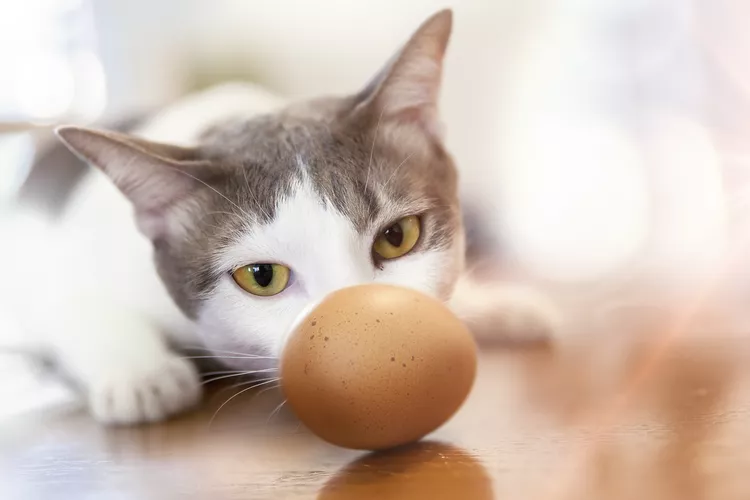
The American Egg Board has never let us forget that eggs are a staple, especially in breakfast food. Plus, they can be prepared a myriad of ways. Does this apply to your cat, though? Can you feed your cat raw eggs, or should you cook them first?
Many proponents of raw feeding in cats tout raw eggs as a great addition to a cat's raw diet because they are packed with protein. They may also believe that cooking the egg will denature the proteins, making them less usable for your cat's body and digestive system.
One of these proteins, called avidin, can actually be harmful when ingested in its raw form. This is because avidin, in its raw form, bonds very tightly to Vitamin B7, also called biotin. Biotin is a water-soluble vitamin, which means it isn't stored in the body as long as fat soluble vitamins. Cats use biotin for protein and fat metabolism. It is also utilized in your cat's adrenal glands, thyroid gland, nervous system, and their skin, fur, and nails. Cats that are routinely fed raw eggs for an extended period of time may start to exhibit signs of biotin deficiency, which may include a shabby hair coat, skin lesions and hair loss, especially on the face and legs, decreased appetite, and diarrhea. Cooking eggs denatures the avidin in the egg white. This means it makes it less likely to lead to biotin deficiency because denatured avidin cannot bind as readily to biotin.
Another risk associated with feeding raw eggs is bacterial contamination. Feeding your cat raw eggs puts them at risk of ingesting live cultures of Salmonella and/or E. coli that may be contaminating the eggs. Both of these bacteria can cause your cat to be very sick. Salmonellosis and Colibacillosis in cats can cause a variety of symptoms, including vomiting and diarrhea, anorexia and weight loss, fever, lethargy, dehydration, abnormal tachycardia (a fast heart rate), and swollen lymph nodes. If left untreated, they both can also lead to a life threatening condition called septicemia. Septicemia is, quite literally, an infection in a cat's blood stream and requires immediate veterinary attention. The Salmonella and E. coli in raw eggs aren't just a concern for your cat. You also could be at risk of Salmonellosis and/or Colibacillosis, either from handling the raw eggs yourself or by contracting it from your cat.
Of course, Salmonella and E. coli is are concerns for raw feeding as well. However, there are some commercial raw diets that undergo a process called high pressure pasteurization that successfully kills any bacteria in the food without having to cook it. If you are thinking about feeding your cat a raw diet, it's definitely something to keep in mind when choosing whether to do home made raw or commercial raw.
Raw eggs are unsafe for cats to eat, but that doesn't mean that, when properly prepared, they don't provide a nutritious snack for your cat. The proteins and amino acids found in eggs can actually make them a healthy snack option for some cats. Cats, being strict carnivores, need animal protein in their diet, and eggs are believed to be nutritionally complete when it comes to protein.
Aside from the dangers of raw eggs, there are considerations before feeding your cat cooked eggs. While the white is protein packed, the yolk contains much more fat. This can not only predispose a cat to obesity, but it can also put a cat at risk of of pancreatitis, a painful inflammation of the pancreas. Diabetic cats may be especially at risk of pancreatitis. The shell can be a source of calcium, but take care in how it is prepared to avoid causing irritation to a cat's mouth or the lining of their gastrointestinal tract.
Additionally, if your cat is otherwise healthy and on a commercial diet, whether raw or traditional, it shouldn't need calcium supplementation. Too much calcium can be detrimental to all of your cat's organ systems, but especially to your cat's kidneys, nervous system, and their cardiovascular system.
If you want to treat your cat to an egg, the safest way to do so is to boil it or scramble it with no salt or seasonings. If your cat is susceptible to gastrointestinal upset or pancreatitis, feed only the egg white. This will help minimize the ingestion of extra fats that may aggravate your cat's GI tract. Keep in mind that any diet change or new treat can lead to diarrhea or stomach upset. If you do feed your cat the cooked yolk portion, do so only in moderation. One whole egg contains a large percentage of a cat’s daily calorie requirement, so cats should be fed partial eggs as an occasional treat.
Take care if you decide to try to feed your cat eggs. As with most human foods, speak to your veterinarian before giving them a nibble.
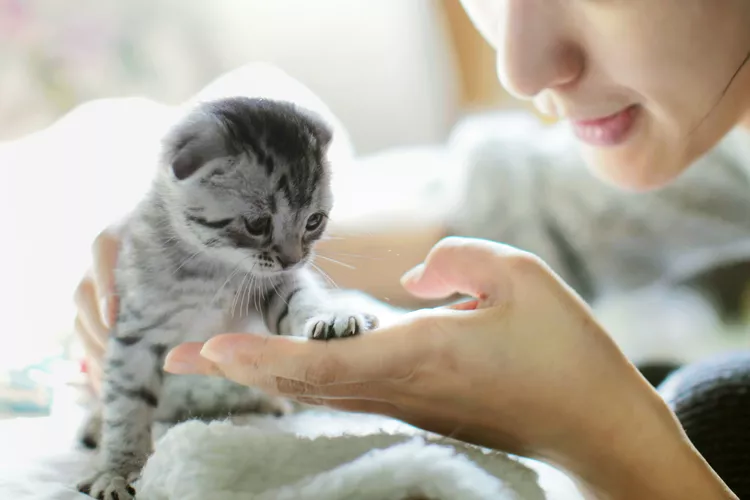
The First 30 Days With Your New Kitten
The first month is full of changes and excitement for a kitten in a new home. Find out what to expect and what you can do for your new feline friend.
How Old Is Your Cat in Human Years?
As a cat ages, there are often behavioral and physical changes too. Find out how to convert cat years to human years and what to expect at each stage.
What to Buy for Your New Cat: A List of Essentials
Before you bring your new cat or kitten home, there are a number of things to collect or buy so your cat will feel welcomed like a family member.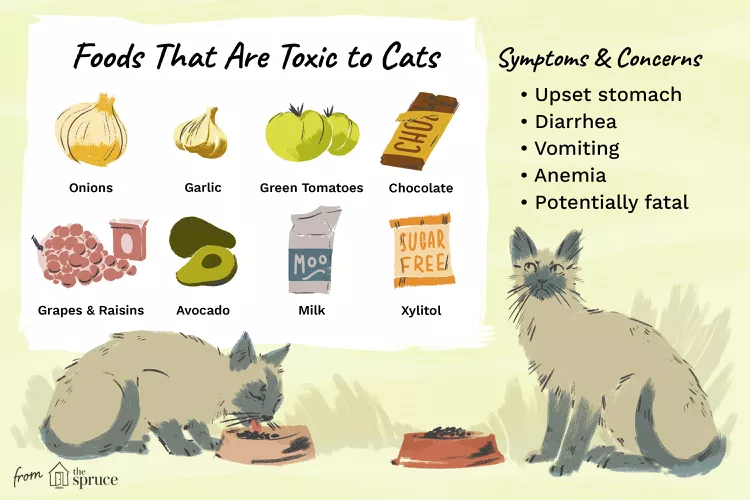
Human Foods That Are Poisonous to Cats
Many human foods are toxic to cats. Avoid feeding cats table scraps. Instead, feed a nutritious cat food created for their specific nutritional needs.
Cat Food Ingredients to Avoid
When checking the nutrition content of cat food, look for ingredients that are not healthy or show it is of poor quality. Avoid these 3 ingredients.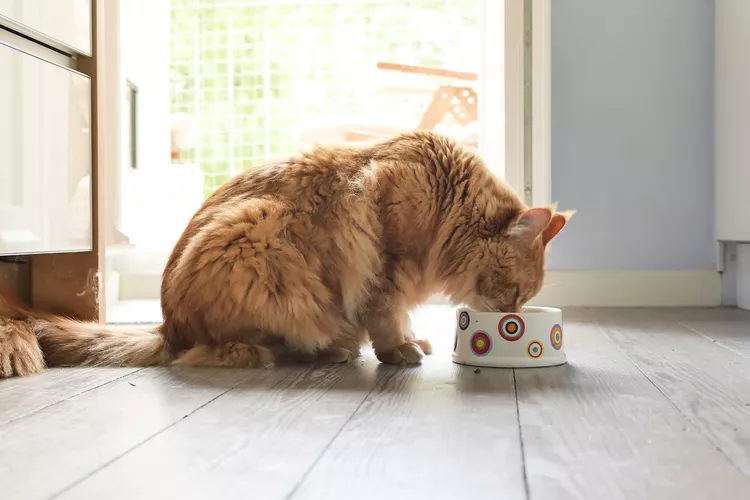
Should You Feed Your Cat a Raw Diet?
Learn the pros and cons of raw diets for cats, and find out how to choose a raw food diet for your own cat.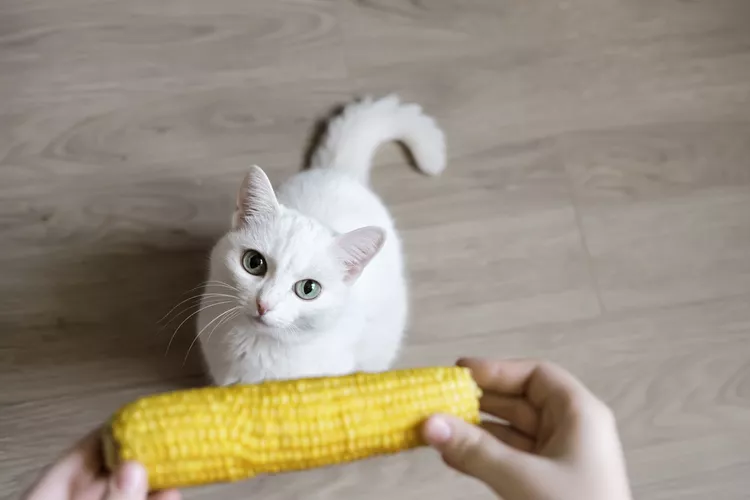
Can Cats Eat Corn? Here's What A Vet Thinks
Corn is a common ingredient in cat food and can be a safe treat for cats when fed in moderation. Find out more about how to safely feed corn to your cat.
10 Obscure, Little-known Canine Facts in Honor of National Dog Day
With National Dog Day upon us, it's time to celebrate everything about our favorite pets—even the weirder stuff. Here are 10 obscure facts about dogs you probably didn't know.
The Different Types of Pet-Friendly Workplaces
Discover the different types of pet-friendly workplaces and the benefits they offer employees. Learn how to create a pet-friendly workplace and the best practices for pet owners.
Exploring the Different Types of Pet-Friendly Beaches
Are you looking for pet-friendly beaches? Learn about the different types of pet-friendly beaches, their locations, and tips for visiting them with your pet.
Why Is My Dog Lethargic?
Lethargy can be a sign that something is wrong with your dog. Find out what may be causing this lack of energy and what you should do about it.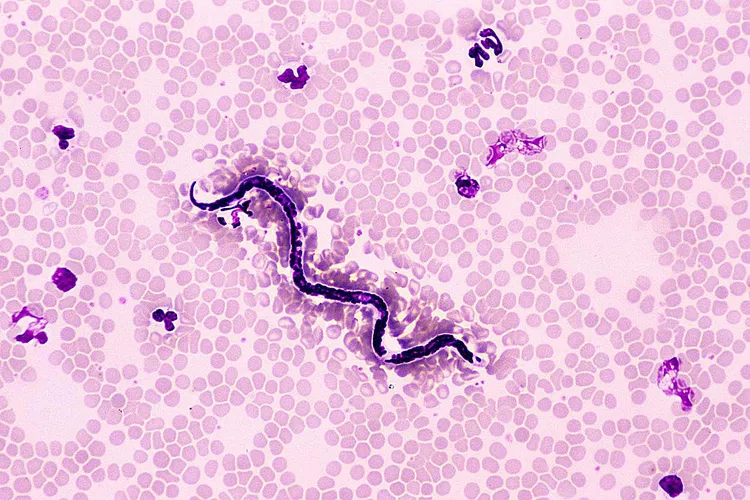
Medications to Prevent Heartworm Disease for Dogs
Heartworm disease is a serious risk for all dogs exposed to mosquitos. Find out about the products used to prevent Heartworm disease in dogs.
Can My Dog Eat Tomatoes?
You'll want to keep Fido out of your garden since the tomato plant is toxic, but you can safely offer him ripe tomatoes as a nutrient-packed treat.
15 Best American Cat Breeds
Several cat breeds, including the American shorthair and Bengal, have their origins in the United States. Learn more about these American cat breeds.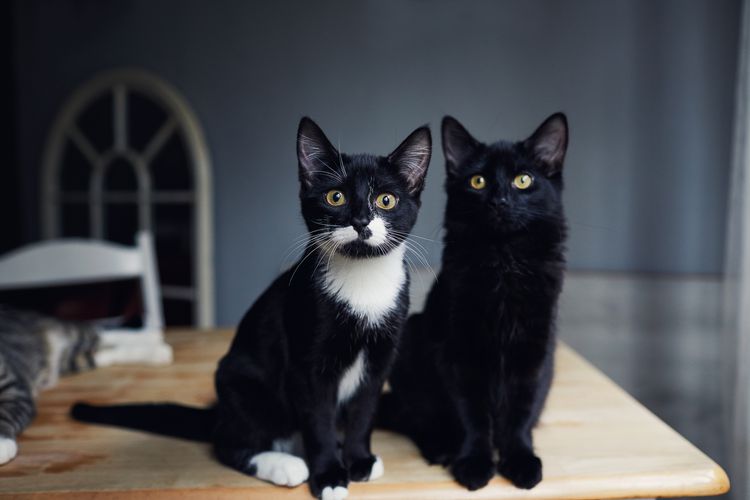
Why Do Cats Slap Each Other?
Cats can have some quirky behaviors—one of them being slapping each other. Why do they do this and what can you do to stop it?
Skye Terrier: Dog Breed Characteristics & Care
Learn all about the Skye Terrier, an elegant breed known for its friendly and even-tempered personality with classic terrier traits.
Sloughi: Dog Breed Characteristics & Care
Learn all about the Sloughi, an ancient dog breed known for its impressive running ability, slim stature, and affection toward its family.
English Setter: Dog Breed Characteristics & Care
Learn about the English setter, an excellent hunting breed for pointing and retrieving game. It's also a popular and affectionate companion dog.
Why Dogs Bury Bones and Other Objects
If you give a dog a bone, he might bury it. Why is that? Learn about this burying behavior in dogs and what it means for your pet.
Reasons Why Dogs Run Away and How to Stop It
Dogs can escape, especially if they’re bored and not properly contained. Here are some techniques for stopping your dog from running away.